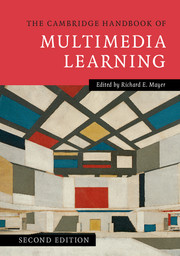Book contents
- The Cambridge Handbook of Multimedia Learning
- The Cambridge Handbook of Multimedia Learning
- Copyright page
- Contents
- Contributors
- Preface
- Acknowledgments
- 1 Introduction to Multimedia Learning
- Part I Theoretical Foundations
- Part II Basic Principles of Multimedia Learning
- Part III Advanced Principles of Multimedia Learning
- 15 The Guided Discovery Learning Principle in Multimedia Learning
- 16 The Worked Examples Principle in Multimedia Learning
- 17 The Self-Explanation Principle in Multimedia Learning
- 18 The Generative Drawing Principle in Multimedia Learning
- 19 The Feedback Principle in Multimedia Learning
- 20 The Multiple Representation Principle in Multimedia Learning
- 21 The Learner Control Principle in Multimedia Learning
- 22 Animation Principles in Multimedia Learning
- 23 The Collaboration Principle in Multimedia Learning
- 24 The Expertise Reversal Principle in Multimedia Learning
- 25 The Individual Differences in Working Memory Capacity Principle in Multimedia Learning
- Part IV Multimedia Learning of Cognitive Processes
- Part V Multimedia Learning in Advanced Computer-Based Contexts
- Author Index
- Subject Index
25 - The Individual Differences in Working Memory Capacity Principle in Multimedia Learning
from Part III - Advanced Principles of Multimedia Learning
Published online by Cambridge University Press: 05 August 2014
- The Cambridge Handbook of Multimedia Learning
- The Cambridge Handbook of Multimedia Learning
- Copyright page
- Contents
- Contributors
- Preface
- Acknowledgments
- 1 Introduction to Multimedia Learning
- Part I Theoretical Foundations
- Part II Basic Principles of Multimedia Learning
- Part III Advanced Principles of Multimedia Learning
- 15 The Guided Discovery Learning Principle in Multimedia Learning
- 16 The Worked Examples Principle in Multimedia Learning
- 17 The Self-Explanation Principle in Multimedia Learning
- 18 The Generative Drawing Principle in Multimedia Learning
- 19 The Feedback Principle in Multimedia Learning
- 20 The Multiple Representation Principle in Multimedia Learning
- 21 The Learner Control Principle in Multimedia Learning
- 22 Animation Principles in Multimedia Learning
- 23 The Collaboration Principle in Multimedia Learning
- 24 The Expertise Reversal Principle in Multimedia Learning
- 25 The Individual Differences in Working Memory Capacity Principle in Multimedia Learning
- Part IV Multimedia Learning of Cognitive Processes
- Part V Multimedia Learning in Advanced Computer-Based Contexts
- Author Index
- Subject Index
Summary
Effective use of the working memory system is critical for successful learning, and this assumption has motivated much of the work on multimedia instruction. Interestingly, the limited capacity of human working memory has been invoked as part of explanations for both advantages and disadvantages of multimedia learning in comparison with learning from text or pictures alone. This chapter reviews several lines of reasoning that have guided explorations of the role of working memory in multimedia learning, including approaches that have emphasized the modality-specific buffer system and the potential for overloading the limited resources that are available to learners; as well as a newer approach that considers working memory capacity as an individual differences variable representing attentional control.
Keywords
Information
- Type
- Chapter
- Information
- The Cambridge Handbook of Multimedia Learning , pp. 598 - 620Publisher: Cambridge University PressPrint publication year: 2014
Accessibility standard: Unknown
- 31
- Cited by
